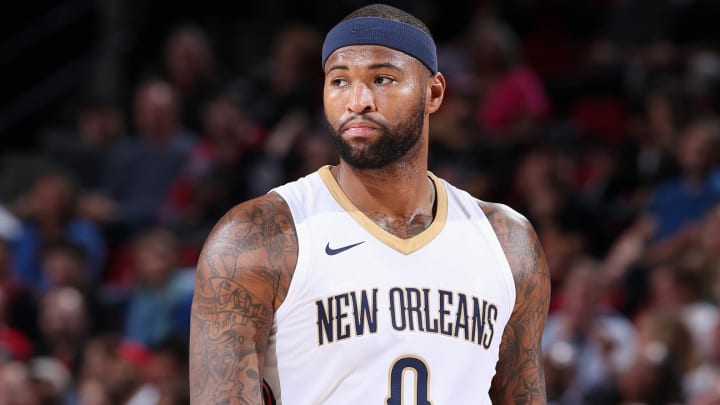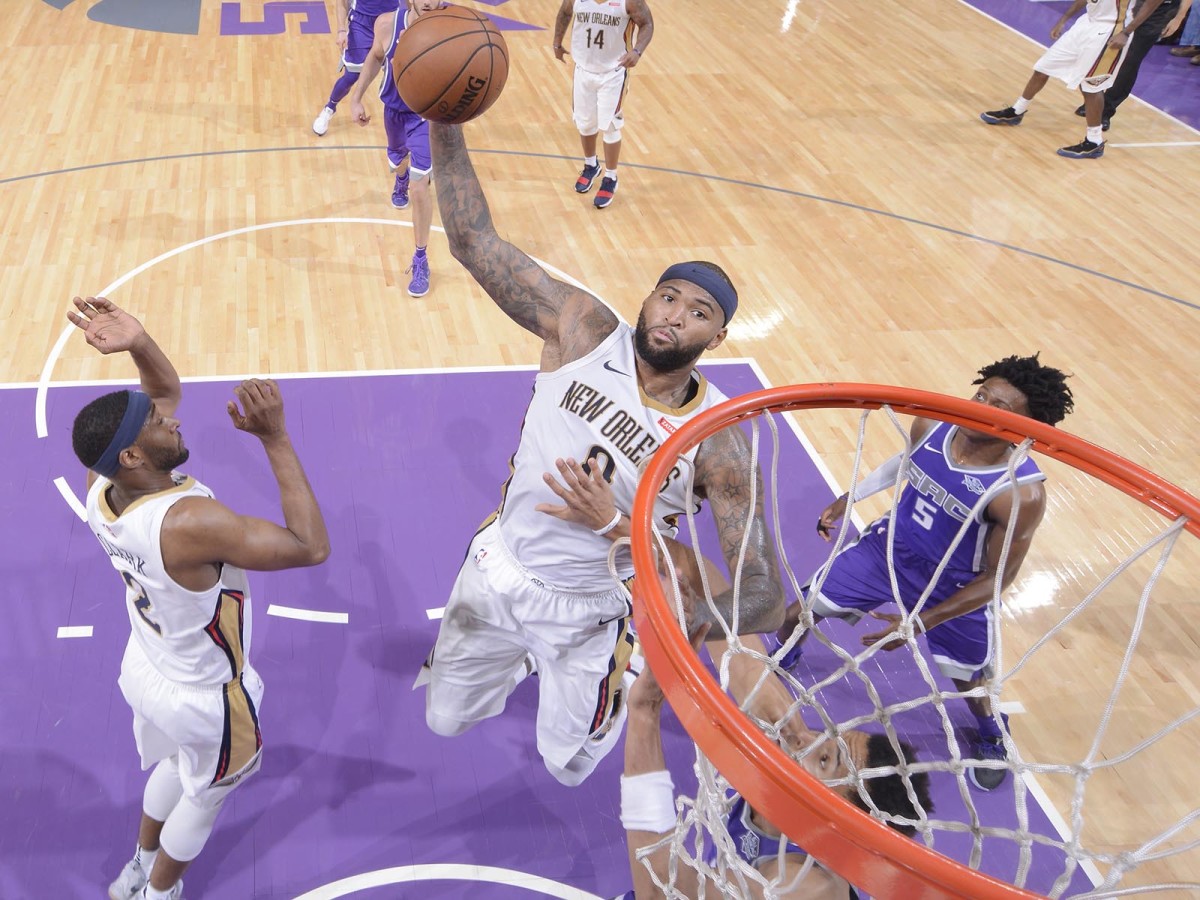For DeMarcus Cousins, Misplaced Loyalty Isn't a Mistake He'll Make Twice

DeMarcus Cousins’s return to Sacramento was more catharsis than revenge.
The All-Star center pummeled the Kings en route to a historic stat line, but he did so with a level of self-control that has so often eluded him. After New Orleans conceded 40 points in the first quarter, he didn’t self-combust. After a pre-game standing ovation slowly morphed into occasional jeers, he didn’t respond. And after a ticky-tack charge call with three minutes left threatened to swing the game’s momentum, Cousins barely reacted to the whistle, choosing instead to score seven of the Pelicans’ final nine points to close out the 114-106 road win.
No player has posted Cousins’s final tallies—41 points, 23 rebounds and six assists—in an NBA game in more than 30 years. He chased that performance with a sober post-game interview on TNT copping to being “nervous as hell” and expressing “nothing but love” for Kings fans. Vivek Ranadive’s decision to trade Cousins on All-Star Sunday was as inconsiderate and amateurish as it gets. By contrast, Cousins’s official reply was thoroughly professional in every respect—skilled, steady, and dignified.
SacTown Royalty, a popular Kings blog, ran a column this week asserting that Sacramento “deserved to lose” to Cousins. Mounting a counterargument would be nearly impossible. Thursday night’s result, which came without Anthony Davis in the lineup for New Orleans, provided convincing evidence that Cousins is in a better place mentally and playing for a better team. The Kings (1-4) look years removed from playoff contention, and they won’t have a credible Cousins replacement until teenage point guard De’Aaron Fox is of legal drinking age, at the very earliest.
In the run-up to his much-anticipated return to the Golden 1 Center, the 27-year-old Cousins told E:60 that his “biggest regret” during his six-plus years in Sacramento was remaining “loyal” during the tumultuous tenure of former coach George Karl. “I should have left when I had the chance and avoided it all. … I kind of blame myself for even putting myself at that point. You knew coming in this was a business. How are you going to be loyal to something that ain’t loyal to any player that's ever played this game? I was a fool."
Reaching that conclusion, after so many dramatic twists that culminated with a lamentable final split, required both time and distance. No doubt, Cousins has moved on more easily from the Kings than vice versa. Stars control the NBA’s power balance more than ever; Wayward organizations, led by quirky owners and shaky executives, have an increasingly hard time selling hope in the Superteam era.
For Cousins, an unrestricted free agent this summer, the next step should be to apply the key takeaway from his Kings tenure to his new life with the Pelicans. Misplaced loyalty can lead to regrets anywhere, not just with a Kings organization that cycled through six coaches in six years. Yes, Davis’s presence alone makes New Orleans a better home than Sacramento, but that’s a low bar. In the coming months Cousins must raise his standards even higher to avoid repeating the same mistake.

The NBA has entered full-on mercenary mode, and Cousins shouldn't go out of his way to force a fit in New Orleans. Cousins should—and surely will—give his unusual Twin Towers pairing with Davis his best shot over the next two or three months, but he should be prepared to pull the plug if it doesn’t work. Cousins can’t wipe Omer Asik and Alexis Ajinca from New Orleans’s salary cap sheet, he can’t place healing hands on Solomon Hill, and he can’t transform Rajon Rondo and Tony Allen into floor-spacers. Cousins shouldn’t feel responsible if Rondo can’t stay healthy or if the Rondo/Jrue Holiday pairing doesn’t mesh. Cousins can’t make the Pelicans’ owners care about basketball more than football, and he shouldn’t feel burdened by ongoing hot seat talk for GM Dell Demps and coach Alvin Gentry.
The good news for the Pelicans: The West’s muddled middle includes numerous early underperformers. For New Orleans to crack the playoffs, the likes of Minnesota, Utah and Denver must continue struggling to shape new identities. Last year, Davis and company spent the whole season digging out of an 0-8 hole. Against that standard, a 2-3 start and a minor knee injury for Davis somehow feels slightly hopeful.
Cousins told E:60 that he was “happy” with the Pelicans because they are “playing for something.” That sentiment is accurate now, but it might not hold up through the trade deadline. A thin Pelicans rotation, one that received a much-needed boost from Nuggets cast-off Jameer Nelson, could crumble. Davis could continue to miss time here and there. Cousins and Davis could form a profitable pairing, but still find that their experiment loses the stylistic clashes and positional mismatches more often than not. Rondo’s entry into the lineup could prove to do more harm than good. A top eight in the West could emerge and leave New Orleans in the dust.
Should the Bucks Trade for Eric Bledsoe?
If the Pelicans do falter, Cousins should heed his own lesson about loyalty and, perhaps, look back on his career night against the Kings as a reason to put himself first. New Orleans needed every bit of his 41/23/6 to get past one of the league’s worst teams, and Gentry played Cousins a whopping 44 minutes because his frontcourt depth was nonexistent without Davis. Through a small sample of five games, New Orleans is +26 with Cousins on the court and -41 when he’s on the bench. Cousins proved his point to the Kings—that they couldn’t stop him—but it’s not clear whether he’s making real progress towards the first postseason appearance of his career.
There should be a market for Cousins’s services come February, especially if he can maintain the restraint he displayed against Sacramento. Toronto rented Serge Ibaka at last year’s deadline and then re-signed him to a healthy contract. This summer, Oklahoma City added Paul George and Houston traded for Chris Paul despite their one-year deals. Cleveland acquired Isaiah Thomas in the Kyrie Irving blockbuster even though he had a bum hip and an expiring contract.
New Orleans is a ripe seller if things go south, given Cousins’s offseason flight risk, Demps’s need to salvage some return on his initial trade package for Cousins, and the organization’s dual needs to surround Davis with talent and dump bad contracts. The Cavaliers, Wizards and other aspiring contenders should start weighing the pros and cons of a Cousins trade now, assuming they haven’t already.
After years spent clinging to a broken relationship with the Kings, Cousins’s best move now is to fully embrace his leverage. Ibaka, George, Paul and Thomas (once healthy) are among the impact players who have landed in greener pastures in recent months. George and Paul, in particular, played active roles in leaving their previous organizations. If a better opportunity materializes in February, Cousins shouldn’t hesitate.
There’s no good reason for a star this talented, on an expiring contract, to miss the postseason for the eighth time in eight years. Cousins’s feeling of foolishness need not linger past the 2018 deadline.
